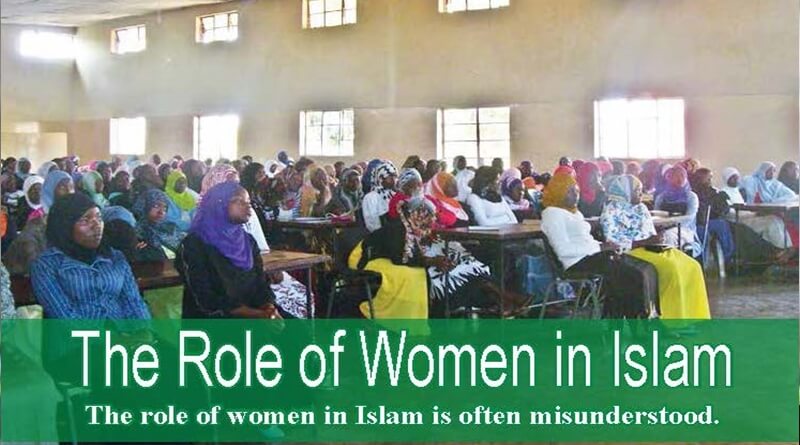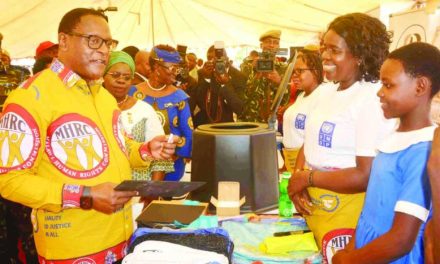
The Role of Women in Islam

many cases, outsiders looking in at the women in Islam perceive their role to be one associated with several negative connotations. These stereotypical stigmas force the women within the Islamic culture to be somewhat guarded because these social stigmas infringe on their culture and personality as an
individual.
One of the most common misconceptions is that women live under some sort of oppressive dictatorship ruled by their husbands and fathers. Stemming from this misconception also lies the misunderstanding that women are forced into marriage and are severely oppressed by wearing a veil. While some of the basis of these ideas are true, they’re not oppressive of the women within the Islamic community.
Instead many of these ideals are customary and are ingrained within the culture. The role of the Muslim woman is to raise the children and be a good wife. Women are encouraged to carry out all of these duties with a devotion and enthusiasm. However, isn’t that what most cultures perpetuate women to be – domestic providers that supply a nurturing environment of unconditional love and devotion? Therefore, it’s not out of the ordinary for a woman to be perceived as the individual responsibility for planning family events, raising children, cleaning the house, preparing meals, and representing the family within social settings.
The Muslim community has progressed and moved forward with many modern views. The woman’s role is no longer just a mother and wife. Islam permits the women, within its culture, to voyage on the Hajj pilgrimage, to exercise the right to vote, engage in politics, to have a job and even run a business as the business owner. And women in Islam have embraced these rights by partaking in all of available platforms. Women within other cultures have also become more accepting with women becoming breadwinners within their household and have also got rid of social stigmas that have overshadowed the gender of women in general. While many spectators have focused on the women in Islam due to social stigmas and stereotypes, it’s important that outsiders also look within their own community before judging the role of women in Islam. Many of the misconceptions that we fixate on the Muslim culture are actually relevant within other mainstream cultures as well.
Another misconception is the role of education. Many people believe that Muslim women are not allowed to receive an education – which in fact couldn’t be further from the truth. A basic of understanding of the life of Muhammad and knowledge of the wives of the Prophet reveal several examples of women excelling within their fields of knowledge. For example, The Prophet’s wife Khadijah was not only a businesswoman but a very successful one. The Muslim community encourages the role of women in Islam to be one that is educated and the Islamic world wants them to excel within their areas of interest and expertise. An important role of women in Islam is to educate themselves. Both on an academic level and within their culture. And across the board Muslim women are pushing the envelope and doing just that.
Moreover, Islam understands that it’s important to educate and nurture all genders because the Muslim community relies on the next generation to lead them. The Khilafah State is obligated to provide women with the highest level of education and view women as valuable citizens of the state. The role of women in Islam is viewed as vital and honorable.
Muslim women engaging in politics is not a new phenomenon, an early example of this is at the time of the Prophet Muhammad when the leaders of Yathrib sent a party of Bani Khazraj to pledge their allegiance to him. This group was comprised of 62 men and two women who pledged allegiance. The pledge of Aqabah is well known to have had both spiritual and political implications. The pledge was not only a declaration of accepting Islam but was a promise of political support and military protection. Later examples continue to support the idea of women in politics. In the early fourth century A.H, Um Muqtadir Billah, the mother of the Abbasid Khaleefah set up a tribunal for the purpose of settling people’s petitions and lawsuits and placed one of her female courtiers as judge.
Yes, at first glance the idea of
62 to two appears daunting. But, think about it on realistic terms. Women were not viewed as equals in the United States from the beginning. Therefore, the idea that women were respected enough to engage in politics during this early time period is a huge break through. Furthermore, it may also reveal to outsiders looking in that the role of women in Islam is equalized in comparison to men. It could also be perceived that quite possibly the Muslim community is ahead of many other cultures – on the equality spectrum.
Allah says: “The believers, men and women, are protecting friends (Awliya) of one another; they join the ma’ruf (that which Allah commands) and forbid people form munkar (that which
Allah prohibits); they perform salat, and give the zakat, and obey Allah and His Messenger. Allah will have mercy on them. Surely Allah is All mighty, All wise” – At Taubah: 71
The role of women in Islam has continuously be projected as one that is worthless and not capable of being expressive on a political platform. However, that is not at all the case. History has revealed the progressive nature of the role of women in Islam. Furthermore, the Muslim women are continuing to push the envelope and reach new heights. Like other cultures, the idea of women achieving greatness is somewhat jaded because of the underlying social stigmas and stereotypes pre- existing. It’s important that the role of women in Islam not only be to continue to break barriers and achieve greatness, but to breakdown the stereotypes that are hundreds and hundreds of years old. Once we’re able to do this as outsiders looking into the women of Islam then we’ll be able to move forward as a whole.

































